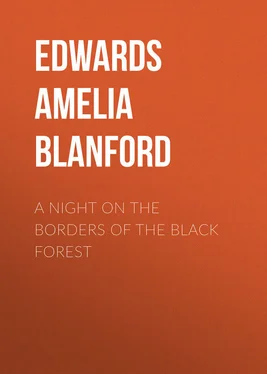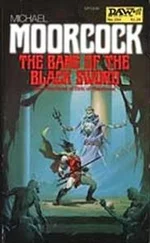Amelia Edwards - A Night on the Borders of the Black Forest
Здесь есть возможность читать онлайн «Amelia Edwards - A Night on the Borders of the Black Forest» — ознакомительный отрывок электронной книги совершенно бесплатно, а после прочтения отрывка купить полную версию. В некоторых случаях можно слушать аудио, скачать через торрент в формате fb2 и присутствует краткое содержание. Жанр: foreign_antique, foreign_prose, foreign_sf, на английском языке. Описание произведения, (предисловие) а так же отзывы посетителей доступны на портале библиотеки ЛибКат.
- Название:A Night on the Borders of the Black Forest
- Автор:
- Жанр:
- Год:неизвестен
- ISBN:нет данных
- Рейтинг книги:5 / 5. Голосов: 1
-
Избранное:Добавить в избранное
- Отзывы:
-
Ваша оценка:
- 100
- 1
- 2
- 3
- 4
- 5
A Night on the Borders of the Black Forest: краткое содержание, описание и аннотация
Предлагаем к чтению аннотацию, описание, краткое содержание или предисловие (зависит от того, что написал сам автор книги «A Night on the Borders of the Black Forest»). Если вы не нашли необходимую информацию о книге — напишите в комментариях, мы постараемся отыскать её.
A Night on the Borders of the Black Forest — читать онлайн ознакомительный отрывок
Ниже представлен текст книги, разбитый по страницам. Система сохранения места последней прочитанной страницы, позволяет с удобством читать онлайн бесплатно книгу «A Night on the Borders of the Black Forest», без необходимости каждый раз заново искать на чём Вы остановились. Поставьте закладку, и сможете в любой момент перейти на страницу, на которой закончили чтение.
Интервал:
Закладка:
We travelled on together to Athens, and there parted, Turnour being bound for England, and I for the East. My own tour lasted many months longer. I went first to Egypt and the Holy Land; then joined an exploring party on the Euphrates; and at length, after just twelve months of Oriental life, found myself back again at Trieste about the middle of April in the year following that during which occurred the events I have just narrated. There I found that batch of letters and papers to which I had been looking forward for many weeks past; and amongst the former, one from Coventry Turnour. This time he was not only irrecoverably in love, but on the eve of matrimony. The letter was rapturous and extravagant enough. The writer was the happiest of men; his destined bride the loveliest and most amiable of her sex; the future a paradise; the past a melancholy series of mistakes. As for love, he had never, of course, known what it was till now.
And what of the beautiful Salome?
Not one word of her from beginning to end. He had forgotten her as utterly as if she had never existed. And yet how desperately in love and how desperately in despair he was "one little year ago!" Ah, yes; but then it was "one little year ago;" and who that had ever known Coventry Turnour would expect him to remember la plus grande des grandes passions for even half that time?
I slept that night at Trieste and went on next day to Venice. Somehow I could not get Turnour and his love-affairs out of my head. I remembered our visit to the Merceria. I was haunted by the image of the beautiful Jewess. Was she still so lovely? Did she still sit reading in her wonted seat by the open counter, with the gloomy shop reaching away behind, and the cases of rich robes and jewels all around?
An irresistible impulse prompted me to go to the Merceria and see her once again. I went. It had been a busy morning with me, and I did not get there till between three and four o'clock in the afternoon. The place was crowded. I passed up the well-remembered street, looking out on both sides for the gloomy little shop with its unattractive counter; but in vain. When I had gone so far that I thought I must have passed it, I turned back. House by house I retraced my steps to the very entrance, and still could not find it. Then, concluding I had not gone far enough at first, I turned back again till I reached a spot where several streets diverged. Here I came to a stand-still, for beyond this point I knew I had not passed before.
It was now evident that the Jew no longer occupied his former shop in the Merceria, and that my chance of discovering his whereabouts was exceedingly slender. I could not inquire of his successor, because I could not identify the house. I found it impossible even to remember what trades were carried on by his neighbours on either side. I was ignorant of his very name. Convinced, therefore, of the inutility of making any further effort, I gave up the search, and comforted myself by reflecting that my own heart was not made of adamant, and that it was, perhaps, better for my peace not to see the beautiful Salome again. I was destined to see her again, however, and that ere many days had passed over my head.
A year of more than ordinarily fatiguing Eastern travel had left me in need of rest, and I had resolved to allow myself a month's sketching in Venice and its neighbourhood before turning my face homeward.
As, therefore, it is manifestly the first object of a sketcher to select his points of view, and as no more luxurious machine than a Venetian gondola was ever invented for the use of man, I proceeded to employ the first days of my stay in endless boatings to and fro; now exploring all manner of canals and canaletti; now rowing out in the direction of Murano; now making for the islands beyond San Pietro Castello, and in the course of these pilgrimages noting down an infinite number of picturesque sites, and smoking an infinite number of cigarettes.
It was, I think, about the fourth or fifth day of this pleasant work, when my gondolier proposed to take me as far as the Lido. It wanted about two hours to sunset, and the great sandbank lay not more than three or four miles away; so I gave the word, and in another moment we had changed our route and were gliding farther and farther from Venice at each dip of the oar.
Then the long, dull, distant ridge that had all day bounded the shallow horizon rose gradually above the placid level of the Lagune; assumed a more broken outline; resolved itself into hillocks and hollows of tawny sand; showed here and there a patch of parched grass and tangled brake; and looked like the coasts of some inhospitable desert beyond which no traveller might penetrate. My boatman made straight for a spot where some stakes at the water's edge gave token of a landing-place; and here, though with some difficulty, for the tide was low, ran the gondola aground. I landed. My first step was among graves.
" E'l Cimiterio Giudaico, signore ," said my gondolier, with a touch of his cap.
The Jewish cemetery! The ghetto of the dead! I remembered now to have read or heard long since how the Venetian Jews, cut off in death as in life from the neighbourhood of their Christian rulers, had been buried from immemorial time upon this desolate waste. I stooped to examine the headstone at my feet. It was but a shattered fragment, crusted over with yellow lichens, and eaten away by the salt sea air. I passed on to the next, and the next.
Some were completely matted over with weeds and brambles; some were half-buried in the drifting sand; of some only a corner remained above the surface. Here and there a name, a date, a fragment of emblematic carving or part of a Hebrew inscription, was yet legible; but all were more or less broken and effaced.
Wandering on thus among graves and hillocks, ascending at every step, and passing some three or four glassy pools overgrown with gaunt-looking reeds, I presently found that I had reached the central and most elevated part of the Lido, and that I commanded an uninterrupted view on every side. On the one hand lay the broad, silent Lagune bounded by Venice and the Euganean hills – on the other, stealing up in long, lazy folds, and breaking noiselessly against the endless shore, the blue Adriatic. An old man gathering shells on the seaward side, a distant gondola on the Lagune, were the only signs of life for miles around.
Standing on the upper ridge of this narrow barrier, looking upon both waters, and watching the gradual approach of what promised to be a gorgeous sunset, I fell into one of those wandering trains of thought in which the real and unreal succeed each other as capriciously as in a dream.
I remembered how Goethe here conceived his vertebral theory of the skull – how Byron, too lame to walk, kept his horse on the Lido, and here rode daily to and fro – how Shelley loved the wild solitude of the place, wrote of it in Julian and Maddalo , and listened perhaps from this very spot, to the mad-house bell on the island of San Giorgio. Then I wondered if Titian used sometimes to come hither from his gloomy house on the other side of Venice, to study the gold and purple of these western skies – if Othello had walked here with Desdemona – if Shylock was buried yonder, and Leah whom he loved "when he was a bachelor."
And then in the midst of my reverie, I came suddenly upon another Jewish cemetery.
Was it indeed another, or but an outlying portion of the first? It was evidently another, and a more modern one. The ground was better kept. The monuments were newer. Such dates as I had succeeded in deciphering on the broken sepulchres lower down were all of the fourteenth and fifteenth centuries; but the inscriptions upon these bore reference to quite recent interments.
I went on a few steps farther. I stopped to copy a quaint Italian couplet on one tomb – to gather a wild forget-me-not from the foot of another – to put aside a bramble that trailed across a third – and then I became aware for the first time of a lady sitting beside a grave not a dozen yards from the spot on which I stood.
Читать дальшеИнтервал:
Закладка:
Похожие книги на «A Night on the Borders of the Black Forest»
Представляем Вашему вниманию похожие книги на «A Night on the Borders of the Black Forest» списком для выбора. Мы отобрали схожую по названию и смыслу литературу в надежде предоставить читателям больше вариантов отыскать новые, интересные, ещё непрочитанные произведения.
Обсуждение, отзывы о книге «A Night on the Borders of the Black Forest» и просто собственные мнения читателей. Оставьте ваши комментарии, напишите, что Вы думаете о произведении, его смысле или главных героях. Укажите что конкретно понравилось, а что нет, и почему Вы так считаете.












